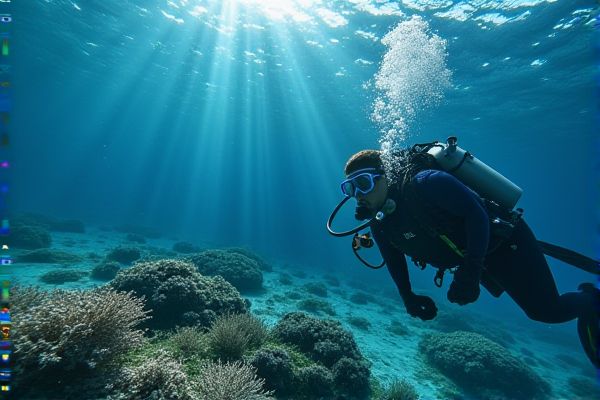
Germany offers a range of oceanography job opportunities across various sectors, including research institutions, universities, and environmental organizations. Positions often focus on marine biology, climate change impact assessments, and marine resource management. The presence of institutions like the Helmholtz Centre for Ocean Research Kiel and the Alfred Wegener Institute provides ample research opportunities for specialists in the field. Proficiency in scientific research methods, data analysis, and collaboration with interdisciplinary teams is highly valued in these roles.
Job Description
Oceanography jobs in Germany encompass a variety of roles focused on studying marine environments, ecosystems, and ocean processes. Positions may include marine research scientists, data analysts, and environmental consultants working in academic institutions, research centers, or governmental organizations. Your responsibilities often involve conducting field research, analyzing oceanographic data, and developing models to predict environmental changes. Proficiency in relevant software and strong analytical skills are essential, alongside a background in marine science, geology, or environmental studies for a successful career in this field.
Requirement
Oceanography jobs in Germany typically require a degree in oceanography, marine biology, environmental science, or a related field. Proficiency in data analysis, modeling software, and laboratory techniques is often essential, alongside a solid understanding of marine ecosystems and research methodologies. Many positions also value experience with fieldwork and research projects, as hands-on skills are critical in this area. For roles in academia or research institutions, a master's or doctoral degree may be necessary to enhance your qualifications and competitive edge.
Salary and Perks Expected
Oceanography jobs in Germany typically offer competitive salaries, which can range from EUR40,000 to EUR70,000 annually, depending on experience and specific roles. Research positions, particularly in governmental and academic institutions, often come with benefits such as health insurance, generous vacation allowances, and opportunities for professional development. Many organizations also promote work-life balance, providing flexible working hours and the option for remote work. Networking in Germany's vibrant scientific community can further enhance career prospects and access to unique projects and funding opportunities.
Similar Job Names
- Oceanographer
- Marine Biologist
- Coastal Zone Manager
- Marine Geologist
- Hydrographic Surveyor
- Environmental Consultant
- Research Scientist
- Oceanographic Technician
- Policy Advisor for Marine Affairs
- Marine Data Analyst
- Fisheries Scientist
- Ocean Climate Scientist
- Marine Ecologist
- Marine Conservation Specialist
- Research Vessel Crew Member
- Oceanographic Instrumentation Specialist
- Coastal Engineering Technician
- Marine Education Coordinator
- Aquatic Toxicologist
- Marine Policy Researcher
Job Expectation Concept
Oceanography jobs in Germany typically involve research, data analysis, and fieldwork related to marine environments. Positions can be found in academic institutions, governmental organizations, and private companies, contributing to areas such as climate change, marine biodiversity, and coastal management. Proficiency in languages, especially German and English, can enhance your opportunities within this competitive field. Candidates often seek advanced degrees and specialized skills to align with the diverse demands of marine science and technology sectors.
Career Advantage and Weakness
Oceanography jobs in Germany offer significant career advantages, such as access to cutting-edge research institutions and a strong focus on environmental sustainability. The country boasts a robust maritime industry, providing numerous opportunities for collaboration with port authorities, NGOs, and academic institutions. However, one notable weakness is the highly competitive job market, which may require advanced degrees or specialized skills. To succeed, staying informed about the latest technological advancements and networking within the field can be beneficial for your career development.
Important Thing Must Know
Oceanography jobs in Germany are diverse and cater to various specializations, including physical, chemical, biological, and geological oceanography. The country is home to several prestigious research institutions and universities that offer strong programs, providing opportunities for both academic and applied research positions. Employers often seek candidates with advanced degrees, preferably at the master's or doctoral level, and relevant experience in marine sciences or environmental studies. With Germany's commitment to sustainability and climate research, there is a growing demand for professionals who can contribute to marine conservation and policy development. Understanding the requirements, including language proficiency in German, can significantly enhance your chances of securing a position in this field.
Alternative Career Options
Oceanography offers diverse career paths in Germany beyond traditional research roles. You can explore positions in environmental consulting firms, where your expertise will aid in assessing and managing aquatic ecosystems. Education and outreach roles in universities or nonprofit organizations allow for a focus on raising public awareness about marine issues. The growing renewable energy sector, particularly offshore wind and tidal energy, also presents opportunities for oceanographers to contribute to sustainable practices and technology development.
Companies List
- German Naval Institute (Marine Technik)
- Alfred Wegener Institute for Polar and Marine Research
- Helmholtz Centre for Ocean Research Kiel (GEOMAR)
- European Maritime Safety Agency (EMSA)
- Institute of Oceanography, University of Hamburg
- Federal Maritime and Hydrographic Agency (BSH)
- Leibniz Institute of Freshwater Ecology and Inland Fisheries (IGB)
- Max Planck Institute for Meteorology
- Ecological Institute for Marine Research (IMAR)
- Fraunhofer Institute for Marine Biotechnology
List of Ideal City
Germany offers several cities that are ideal for oceanography jobs, particularly due to their proximity to the sea and established research institutions. Cities like Kiel are known for their marine science programs and the nearby Helmholtz Centre for Ocean Research, attracting professionals in the field. Bremen, with its strong emphasis on maritime research and technology, also provides ample opportunities for oceanographers. Hamburg, a major port city, hosts numerous organizations specializing in marine environmental research, making it a great location for your career in oceanography.
 germanyjobsdata.com
germanyjobsdata.com